|
|
|
Sort Order |
|
|
|
Items / Page
|
|
|
|
|
|
|
| Srl | Item |
| 1 |
ID:
108958
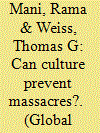

|
|
|
| 2 |
ID:
108966
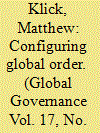

|
|
|
| 3 |
ID:
108956


|
|
|
| 4 |
ID:
108961
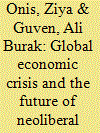

|
|
|
|
|
| Publication |
2011.
|
| Summary/Abstract |
This article outlines the main elements of rupture and continuity in the global political economy since the global economic crisis of 2008-2009. While the current calamity poses a more systemic challenge to neoliberal globalization than genetically similar turbulences in the semi-periphery during the 1990s, we find that evidence for its transformative significance remains mixed. Efforts to reform the distressed capitalist models in the North encounter severe resistance, and the broadened multilateralism of the Group of 20 is yet to provide effective global economic governance. Overall, neoliberal globalization looks set to survive, but in a more heterodox and multipolar fashion. Without tighter coordination between old and emerging powers, this new synthesis is unlikely to inspire lasting solutions to pressing global problems such as an unsustainable international financial architecture and the pending environmental catastrophe and may even fail to preserve some modest democratic and developmental gains of the recent past.
|
|
|
|
|
|
|
|
|
|
|
|
|
|
|
|
| 5 |
ID:
108964
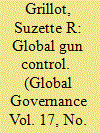

|
|
|
|
|
| Publication |
2011.
|
| Summary/Abstract |
The global spread and misuse of small arms is one of the most alarming and growing security issues of the post-Cold War era. For many reasons, however, controlling the spread of small arms is extremely difficult. Nonetheless, given the serious nature of the small arms issue, numerous states, nongovernmental organizations, and individual activists have sought to address various small arms problems. One of the earliest suggestions that analysts and advocates offered was to develop international norms and standards of behavior that outline the parameters of acceptable small arms activities. Despite the numerous actions that states and NGOs have taken over the past ten years in an effort to combat these problems, corresponding norms are relatively weak or nonexistent. This article seeks to answer why this is the case. It examines why global small arms control norms are largely weak or nonexistent and explains why the prospects for stronger norms are few. Although research on norms in international relations is swelling with studies showing whether, how, and why norms emerge and affect state behavior, few studies focus on cases where norms actually do not emerge or influence action. The primary explanation for weak small arms norms is a competitive normative environment that is facilitated and perpetuated by: (1) competing coalitions that promote opposing norms and ideas and (2) a great-power consensus that works against stronger arms control norms.
|
|
|
|
|
|
|
|
|
|
|
|
|
|
|
|
| 6 |
ID:
108963
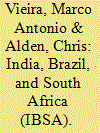

|
|
|
|
|
| Publication |
2011.
|
| Summary/Abstract |
This article argues that the long-term sustainability of the trilateral partnership established in 2003 between India, Brazil, and South Africa (IBSA) rests on a more conscious engagement with their regional partners. The construction of a strong regional leadership role for IBSA based on its members' strategic positions in South Asia, South America, and southern Africa is the proper common ground to legitimize a diplomatic partnership between the IBSA states. This is even more pressing as China is actively competing for markets and influence with the IBSA trio within their respective regions, particularly in Africa. The paradox, though, is that while Northern powers have welcomed the regional leadership role of IBSA's members, most of their neighbors are not convinced of the actual intentions of New Delhi, Brasilia, and Pretoria. As a result, leadership within IBSA is defined in global terms as a claim to lead the developing world. At the regional level, however, IBSA's claim for leadership is less clear, less acceptable, and therefore remains constrained.
|
|
|
|
|
|
|
|
|
|
|
|
|
|
|
|
| 7 |
ID:
108962


|
|
|
|
|
| Publication |
2011.
|
| Summary/Abstract |
Recent peace negotiations practice has given rise to the emergence of two paradigms. In line with normative developments in global human rights protection, internationally brokered peace processes often address the options for accountability for abuses committed in the past and generally cannot include blanket amnesties. At the same time, many agreements end armed conflicts by offering power-sharing incentives for warring parties. In most cases, power-sharing arrangements are likely to clash with attempts to meaningfully deal with truth, accountability, and reparation for past abuses. The tension between the two paradigms gives rise to a number of important challenges and constraints for policymakers and, thus far, there is little practical evidence to guide them in managing the clash.
|
|
|
|
|
|
|
|
|
|
|
|
|
|
|
|
| 8 |
ID:
108959


|
|
|
|
|
| Publication |
2011.
|
| Summary/Abstract |
Leadership is one of the central explanatory factors for change within international organizations yet is often sidelined as a part of wider social processes or understood in the context of domestic and managerial political agency. This article adopts one of the few understandings of leadership within international organization-Robert Cox's 1969 essay on the executive head-as an analytical model for understanding leadership within global HIV/AIDS governance. It does so by applying Cox's framework of analyzing the role of the executive head in relation to the international bureaucracy, member states, and the international system to the position of the former executive director of the Joint United Nations Programme on HIV/AIDS (UNAIDS), Peter Piot. The article argues that the role of leadership transcends the agency of simply opening up the black box of international organizations and is a realm of political knowledge and agenda-setting that is integral to the formation and subsequent longevity of international institutions, alliances, and the global issues that justify their existence.
|
|
|
|
|
|
|
|
|
|
|
|
|
|
|
|
| 9 |
ID:
108960


|
|
|
|
|
| Publication |
2011.
|
| Summary/Abstract |
This article presents the normative case for global tax governance. Contrary to an influential part of the literature, national tax policy choices cause significant externalities for other nation-states. Focusing on business taxation, the article shows that tax competition undermines the integrity and distributive principles of domestic tax systems and aggravates the inequality between developed and developing countries. Further, it demonstrates that the effects of international tax competition are unjust irrespective of whether a globalist or less demanding internationalist perspective on justice is adopted. The minimum requirement of justice is to devise global rules that ensure that national tax systems remain capable of implementing distributive justice as they see fit. Finally, the article presents and discusses a concrete proposal for the global governance of business tax competition, namely, unitary taxation with formula apportionment.
|
|
|
|
|
|
|
|
|
|
|
|
|
|
|
|
|
|
|
|
|